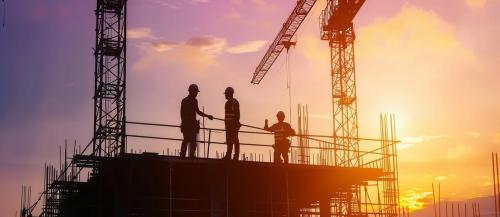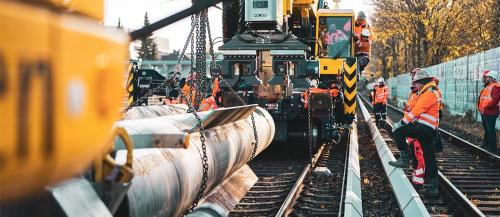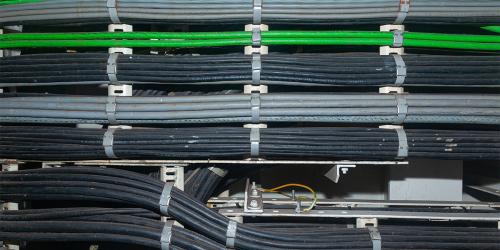At BS Fixings, we know the UK construction industry is a large generator of greenhouse gases, and with this sector currently contributing up to 40% of the nation’s total emissions, it now has a huge responsibility for the nation’s transition to a sustainable, low-carbon economy.
This is now especially the case with the Government’s Net Zero plans, which aim to drastically reduce the levels of carbon emissions emitted within the country by 2050. This objective will involve the implementation and following of policies, as well as identifications of future challenges to ensure that targets are met and that a greener future for the UK is possible.
What is Net Zero and What Does it Mean for the UK?
Net Zero refers to balancing the amount of greenhouse gases produced and the amount removed from the atmosphere. Essentially, achieving Net Zero emissions means that any emissions generated are offset by efforts to remove an equivalent amount from the atmosphere, resulting in a net effect of zero emissions. This can be accomplished through a combination of reducing carbon output and using carbon capture or offsetting measures, such as reforestation or capturing carbon directly from the air.
For the UK, achieving Net Zero by 2050 means significantly reducing its reliance on fossil fuels and transforming industries like energy, transportation, and construction so that they can operate sustainably. Reaching the targets outlined by Net Zero is vital for the UK’s future, as it helps the nation to meet legal obligations, ensure energy security, and protect its natural environment from further damage.
Why is Net Zero Crucial for the UK Construction Industry?
The UK construction industry is a major contributor to greenhouse gas emissions, coming from the construction process itself, the production and transportation of materials, as well as the ongoing energy demands of buildings once they are operational. By decreasing the number of emissions carried out by these actions, a significant portion of the country’s total carbon emissions will be drastically reduced, bringing the UK one step closer to achieving its Net Zero goals.
Key UK Policies Driving the Construction Industry Towards Net Zero
The Clean Growth Strategy (2017)
This policy outlines the steps that the government will take to achieve clean growth whilst cutting greenhouse gas emissions, promoting low-carbon innovation and sustainable practices within the construction sector. This policy outlines measures to support businesses, including those within the construction sector, improve their energy productivity by 20% by 2030, as well as phase out the installation of high carbon forms of fossil fuel heating in new and existing businesses off the gas grid throughout the 2020s.
Future Homes Standard (2025)
Part of the government’s plan to reduce carbon emissions from housing, this standard mandates that new homes must be highly energy-efficient, use low-carbon heating, and be Net Zero-ready by 2025, making the construction industry
Building Regulations and Standards Updates
The government regularly updates building regulations to improve energy efficiency standards in both new builds and renovations. Recent updates to Part L of the Building Regulations, for instance, focus on energy efficiency and aim to cut emissions from new homes by around 31%.
Green Finance and Funding
The UK has introduced green finance schemes, including the Green Homes Grant, to incentivise retrofitting older buildings with energy-efficient solutions. These grants are essential for enabling smaller construction firms and property owners to afford the upfront costs of sustainable improvements.
Challenges Ahead: Future Obstacles for the Construction Industry
Despite these supportive policies and a clear roadmap, the construction industry will face some challenges in meeting the 2050 Net Zero targets, which they will need to acknowledge in order to plan around them.
High Costs of Green Building
Adopting sustainable materials and energy-efficient technologies can be expensive, especially for smaller construction companies. Firms may struggle with the high upfront costs of green alternatives, which can make large-scale implementation challenging.
Retrofitting Existing Buildings
The UK has a large stock of older buildings that are not energy efficient. Retrofitting these buildings to meet modern standards can be costly and often complex, especially for historic or listed buildings.
Resistance to Change
There can be resistance to change within the industry, as some businesses may be reluctant to invest in new technologies or change traditional practices. Overcoming this mindset will require ongoing education and incentives to encourage industry-wide adoption of sustainable practices.
Final Thoughts
We realise that the journey to Net Zero by 2050 represents a transformative challenge for the UK construction industry that will require the following of strict government policies as well as the commitment from industry leaders and workers alike. Achieving these ambitious goals is essential not only for the UK’s climate commitments but also for creating a more resilient, sustainable construction sector.






